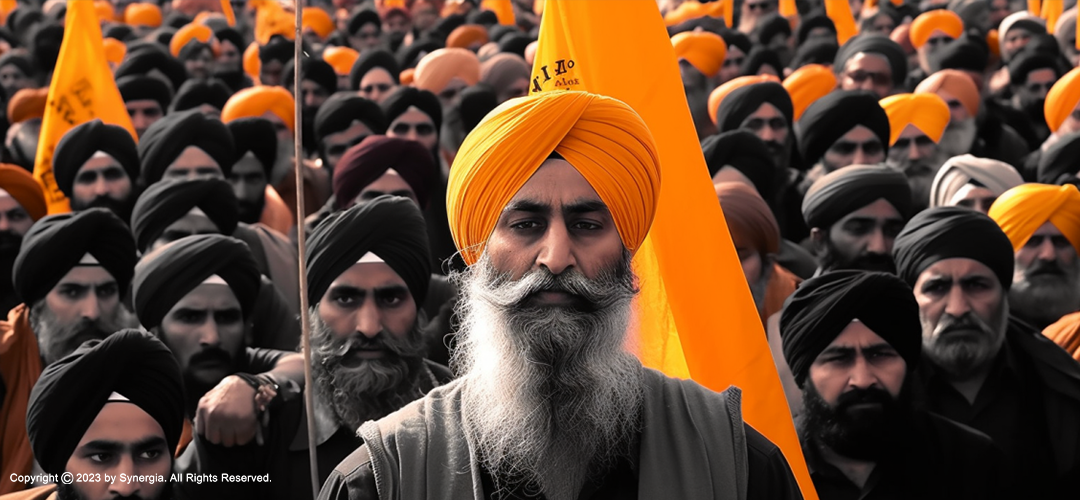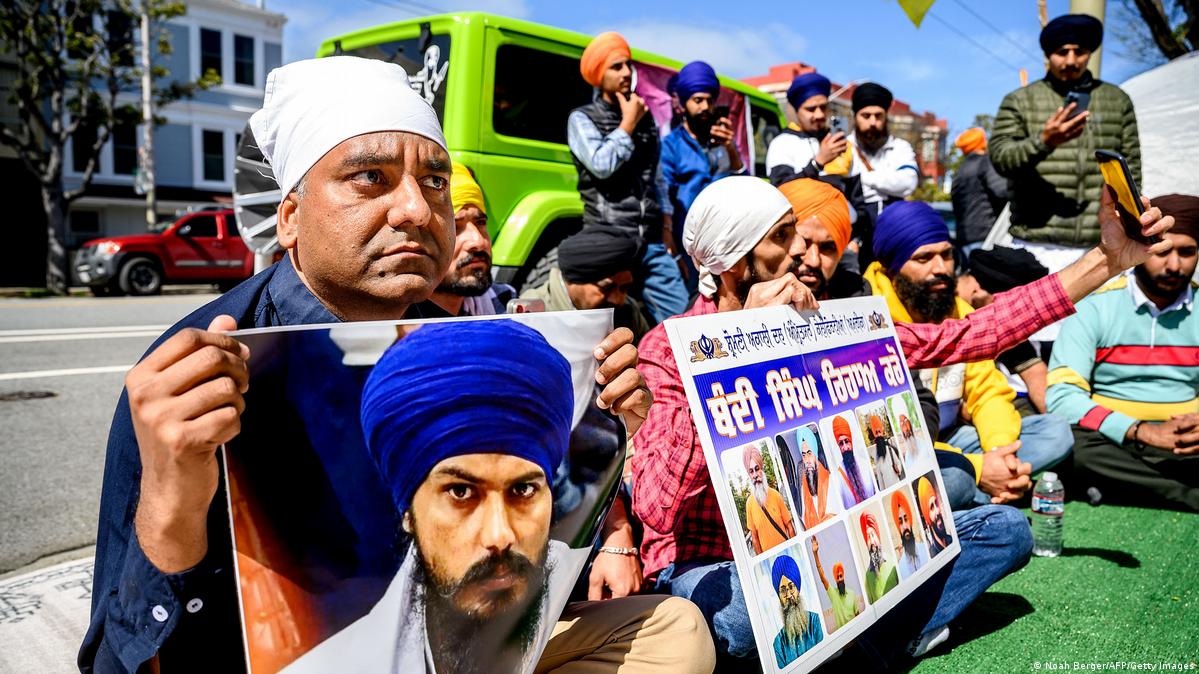Simmering Embers of Disaffection?
April 22, 2023 | Expert Insights

Scenes of Sikh protestors desecrating the Indian National flag at the Indian High Commission were reminiscent of the turmoil-filled days of the Khalistan separatist movement of the 1980s. Many precious lives were lost in a campaign that was largely funded from outside, by Pakistan and Sikh expatriates living abroad, before a heavy hand wielded by the Indian state restored order. Punjab is a frontier state of the Indian Union, and any political turmoil, whether internal or abetted from outside, portends serious security challenges for India.
This time, a little know Sikh separatist leader was in focus-Amritpal Singh- on the run after being declared a proclaimed offender by Indian law enforcement agencies.
After its violent end in the early 1990s, the Khalistan movement has been at a very low ebb in the Indian Punjab. At the same time, its most vociferous advocates have continued from their comfortable environs in North America and the UK. Unsurprisingly, the unfettered freedom these separatists enjoy in Canada and the UK has been a constant irritant between the Indian Government and its counterpart in Ottawa and London.
True to form, the Indian foreign ministry shot out a diplomatic demarche, calling out Whitehall on the incident and questioning militant Khalistan supporters' ability to violate the High Commission's diplomatic immunity whiles exploiting UK asylum laws to abet terrorism in India.
The Indian Government pointed out the expanding base of Khalistan supporters and requested the UK government to undertake stricter monitoring of pro-Khalistan elements. It was clear that there was little ambiguity in the stance of the Indian state taking stringent measures against the Khalistan movement within India and outside of India. The genie cannot be permitted to slip out of the bottle again!
Background
To recapitulate, the Khalistan movement originates in the grievances (perceived or actual, the debate continues) of the Sikh community of Indian Punjab against their neglect by the Delhi government. To many neutral observers, this is surprising as the Sikhs as a community are the most prosperous of all other communities, majority and minority, and have always held a much larger share in the defence forces in relation to their size. They have also made a great impact in the business community across India through the sheer dint of their hard work. They stand to lose far more in case of any turmoil or disturbance initiated by the zealots amidst their ranks.
The Khalistan movement demands a separate Sikh homeland in Punjab. While it has its origins in the partition, the movement reached its peak in the 1980s with rising Sikh militancy and incidents of violence in Punjab. Jarnail Singh Bhindranwale, a prominent movement leader, was killed by the Indian Army when they stormed Amritsar's Golden Temple in Operation Blue Star in 1984. The incident heightened tensions and increased clashes between Sikh insurgents and the Indian Government. As a retaliatory action to the military assault on the holiest of the Sikh shrines, the Sikh police bodyguards of then Prime Minister Indira Gandhi shot her down in cold blood at her official residence. A riot followed in which thousands of innocent Sikhs were brutally butchered all over the country. Then followed years of an intense anti-terrorist campaign waged by the Punjab Police in Punjab's urban and rural landscape, assisted by the Army, which finally crushed the militancy by the late 1990s.
Since then, off and on, there have been sputtering signs of the movement being revived, and the emergence of Amritpal Singh is one such episode. He is trying to project himself in the image of the late Jarnail Singh Bhinderwala, the firebrand Sikh preacher, and using as a platform an organisation called "Waris Punjab De" (the Inheritors of Punjab) founded in 2021 by an actor turned activist after the two-year-long farmers' agitation. The stated objective of this organisation is to fight (if necessary, with lethal force by resorting to arms) for the rights of Punjab. Barely a few months ago, the 30 years old Amritpal was a nobody. It is believed he belongs to a business family involved in the transport business based in Delhi. It is reported that Amritpal, who has also lived in Dubai for over a decade, was attracted to political activities by the farmers' protest and was an active participant. Unlike Bhinderwala, he has no orthodox religious-politico background.
His name came on police radars when his supporters grew increasingly hostile and aggressive in preventing police from executing arrests in Punjab for criminal charges against his followers. The rising popularity amongst militant Sikh youths, already frustrated by the lack of opportunities in Punjab and rising incidences of drug abuse, encouraged Amritpal to call for an armed struggle for the 'ultimate goal of Khalistan.' This made the state and central law enforcement agencies sit up and take note.
As is the case in the subcontinent, the usual suspect-Pakistani ISI- was named by the central agencies for fishing in troubled waters to divert attention from their country's worsening economic and political situation. The foreign-based supporters of the idea of Khalistan were also under the lens. Allegedly, his mastermind is one Avtar Singh Khanda, a UK-based Khalistani advocate.
The Indian state responded in the atypical fashion-selective suspension of the internet, clashes with supporters and a country-wide manhunt to root out Amritpal. The borders of Punjab were sealed to prevent him from slipping out. Since March 18, Amritpal escaped a police dragnet in Jalandhar and has remained untraceable since then. Meanwhile, nine of his prominent aides have been arrested and sent to far-off Dibrugarh in Assam for safe police custody.

Analysis
By insisting that the UK government take countermeasures (tighter monitoring and increased security) in response to the vandalising of the High Commission, India has taken a firm stance against such incidents. In response, the London Metropolitan Police deployed a large security force to patrol the streets. Additionally, the two countries discussed cooperation in areas like counterterrorism, migration, extradition, and anti-India activities in the UK, such as pro-Khalistan extremism.
These steps indicate that the UK government is interested in easing the diplomatic tensions over the issue. Further, a free trade agreement between the two countries is in the works, and the negotiations would benefit from better diplomatic relations. However, it remains to be seen whether the UK government will take active security measures to curb pro-Khalistan activity there.
The Khalistan movement gaining momentum in Punjab receives backing from supporters in other countries. The crackdown on Amritpal Singh has led to reactions amongst the Sikh diaspora in countries like the US, UK, Canada, and Australia, which have sizeable Sikh populations. The protest in London at the High Commission drew around 2000 people. In Canada, pro-Khalistan protesters prevented the Indian High Commissioner from attending a function. Khalistan supporters abroad have protested against the Indian state and organised referendums for years. However, with the recent events in Punjab and the revival of Khalistan sentiment, the support has become more vociferous.
A strict diplomatic stance on the issue is a measure by the Indian Government to curb support for Amritpal Singh by using its foreign policy. In a media statement on the vandalism incidents, the Ministry of External Affairs said that India expects action from the host countries and not just assurance. It hoped foreign governments would prosecute those involved and take measures to prevent a recurrence of such incidents.
Assessment
- India’s firm position on these incidents signifies that it is following a stringent approach towards the matter, considering the growing influence of the Khalistan movement and accompanying national security concerns. This conveys a clear message to the UK as well as to Khalistan supporters within Punjab.
- Additionally, it conveys to other countries like the US, UK, Canada, and Australia that India expects the governments to take action against instances of pro-Khalistan activity, to adequately protect Indian missions and diplomatic personnel, and to factor in this issue in asylum policies and counterterrorism measures.
- Within India, while the overall law and order situation remains under control, the state and the central governments need to carefully calibrate their actions so that unnecessarily in a charged atmosphere, public sentiments are not needlessly aggravated. A soft touch underscored by a mailed fist should be used to speedily arrest the fugitive and allow the law to take its course. In the interim, the people of Punjab must be assured of their worthy place within the Union of India through credible measures on the economic front.








Comments